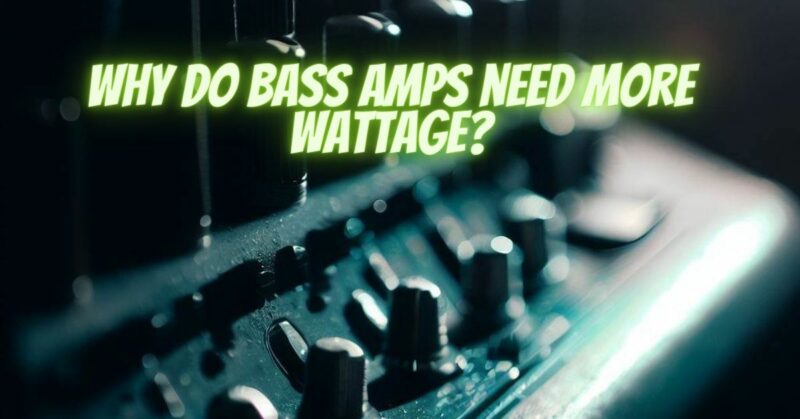When it comes to amplifying musical instruments, different instruments have varying needs due to their distinct frequency ranges and sonic characteristics. One intriguing aspect in the realm of amplification is the need for higher wattage in bass amps compared to guitar amps. This difference arises from the unique demands of bass frequencies and the essential role that bass amps play in delivering a solid foundation for the overall sound. In this article, we will explore the reasons why bass amps require more wattage and the implications of this difference.
The Low-Frequency Challenge
Bass guitars generate lower frequencies than their six-string counterparts, encompassing the deep and resonant tones that form the backbone of a band’s rhythm section. These low frequencies pose challenges that necessitate higher wattage in bass amps.
- Amplitude of Bass Frequencies: Bass frequencies require more power to produce at the same volume level as mid and high frequencies. Amplifying low frequencies demands greater amplifier power, as it takes more energy to move larger speaker cones and reproduce the extended wavelengths.
- Energy Intensity: Lower frequencies require greater energy intensity to maintain clarity and projection. Bass notes have longer wavelengths that require more energy to effectively translate into audible sound without distortion or loss of definition.
The Role of Bass Amps
Bass amps serve a crucial role in live performances and studio recordings by providing the foundational elements that underpin the music. Several factors contribute to the necessity for more wattage in bass amps:
- Maintaining Definition: Bass amps need to maintain definition and clarity, especially at higher volumes. Adequate wattage ensures that the amp can accurately reproduce the nuances of bass playing without losing detail or muddying the sound.
- Handling Dynamic Range: Bassists often play dynamically, moving from subtle, quiet notes to thunderous, booming ones. A higher-wattage bass amp can handle these dynamic shifts while retaining a consistent sonic character and avoiding distortion.
- Supporting Low-End Extension: The deep, powerful low-end frequencies produced by bass guitars require more energy to achieve the necessary impact and resonance. Higher wattage allows bass amps to reproduce these frequencies effectively, contributing to a full and rich sound.
- Stage Presence: In a live setting, bass frequencies need to be felt as well as heard. Higher wattage bass amps can project these low frequencies across larger venues, ensuring that the bassist’s presence is felt by the audience.
Considerations for Bassists
When choosing a bass amp, it’s crucial for bassists to consider their playing context, style, and the venues they will perform in:
- Venue Size: Larger venues require more powerful amps to project the low frequencies effectively. Bassists playing in arenas or outdoor settings might opt for higher wattage to ensure their sound reaches the entire audience.
- Band Dynamics: The musical genre and dynamics of the band also influence the choice of bass amp wattage. In genres where the bass plays a prominent role, higher wattage can help the bass cut through the mix and maintain its presence.
- Tonal Preferences: Bassists with a preference for rich, textured low-end tones might lean towards higher wattage amps to achieve the desired depth and resonance.
The necessity for higher wattage in bass amps arises from the unique demands of bass frequencies and the crucial role that bass plays in shaping the musical foundation. Bassists rely on their amps to provide clear, powerful low-end tones that support the entire ensemble. By understanding the challenges posed by low frequencies and the need for ample power to reproduce them accurately, bassists can make informed choices when selecting the right amp for their musical journey. Whether in a live performance or a studio recording, a well-chosen and appropriately powered bass amp ensures that the heart of the music is felt and heard with precision and impact.


